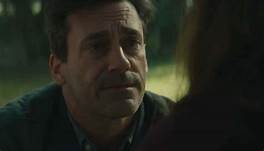Click here for the flashback interview with Mark Pellington for THE LAST WORD.
Polynesians have a word for the power with which we imbue inanimate objects. Manu. There are supernatural overtones to the word’s meaning in its original sense, but the power that objects have for the characters in Mark Pellington’s NOSTALGIA, if not strictly speaking occult, is nonetheless preternatural in its intensity. Using people tangentially connected, the story considers the relationship of the worth of something and of its price. In the process, revealing the complexity of human interaction, where genuine affection can be expressed in the brutal honesty of a withering riposte, and a moment’s comfort can arrive via a stranger with no emotional investment.

Ellen Burstyn, John Ortiz
It starts with an insurance adjuster Danial (John Ortiz) commenting on the jewelry worn by the waitress pouring him coffee in a diner. It’s lovely, but the real value is that it belonged to her grandmother, and she likes to wear it while carrying the great-grandchild she will never know. We will never see that waitress again, but there is something about the way she carries both fetus and ancestress with her that is memorable as Daniel goes about his job. The dying old man (Bruce Dern) surrounded by the accumulated stuff of a lifetime, books, magazines, photos that all carry with them the memory of his late wife, who scoffs at having anything properly appraised in case it has become a collectible. The impatience of his granddaughter (Amber Tamblyn), heavily pregnant and irked that she is the one tasked with tying up her grandfather’s affairs. The aging widow (Ellen Burstyn a study in aching vulnerability), sifting through the ruins of her burned-out home, a recounted memory away from emotional breakdown as she tells Daniel about the night the fire took everything except the sports memorabilia that her husband had received from his father, and that now looms large in the family’s identity; Daniel explaining with an affable impassiveness to her and her friends why he never lets the stories get to him, but Is grateful every day for the surprises his job affords him. And the perspective.

Jon Hamm
In a progression that is subtle, the stories with pregnancies give way to those of adult children and their children, the widow’s loving but obtuse son (Nick Offerman) who must explain to her that her life will now be less independent, spurring her to consult Jon Hamm, the Las Vegas appraiser with cash for the autographed baseball, and a kind word made all the more welcome for its oddly impersonal compassion. Hamm, with a bluff bonhomie and professional smoothness that has become a mask for the inner emptiness at which his sad eyes and slight tensing of lips and body hint, takes us on a further digression, reuniting with his sister (Catherine Keener) in Los Angeles to clean out their childhood home when their parents retire to Florida. Sifting through the trophies and the old dinnerware, they are a prescient study in contrasts, as Keener can bear neither to part with the object, nor to see them, instead relegating much to a storage locker, leaving Hamm to make the decision about what to keep and what to throw away. When an unexpected tragedy occurs, it’s not lamps or furniture that tears at his heart, it’s an unexpected cache of letters that his father wrote to his mother, that in turn imbues a long-forgotten tchatckes with overwhelming mana. Perspectives change, a heart, closed after disappointments, opens a crack.

Catherine Keener
The contemplation in NOSTALGIA of why an object has such power is done with grace, even poetry, as characters literally and figuratively sift through the past, and sift through their feelings. This is a quiet film by design, but the quiet allows, even forces, us to fill in the gaps of these lives, and to be struck with self-recognition, thus becoming heavily invested, and equally devastated to realize the ephemeral nature of objects and people, and the immateriality in which we currently live, the virtual books and music that occupy our minds, and the objects surrounding us that are designed with obsolescence in mind. The contrast between the fluidity of existence and the staying power of feeling is jarring as well as disquieting. Yet, for all the pain of lost love and present disorientation, there is in the intimate cinematography and the raw feelings and understated execution the bittersweet pleasure of having at least felt something. NOSTALGIA is not an easy film, but it is one that is rich and rewarding, even cathartic, if taken on its own terms.
Your Thoughts?